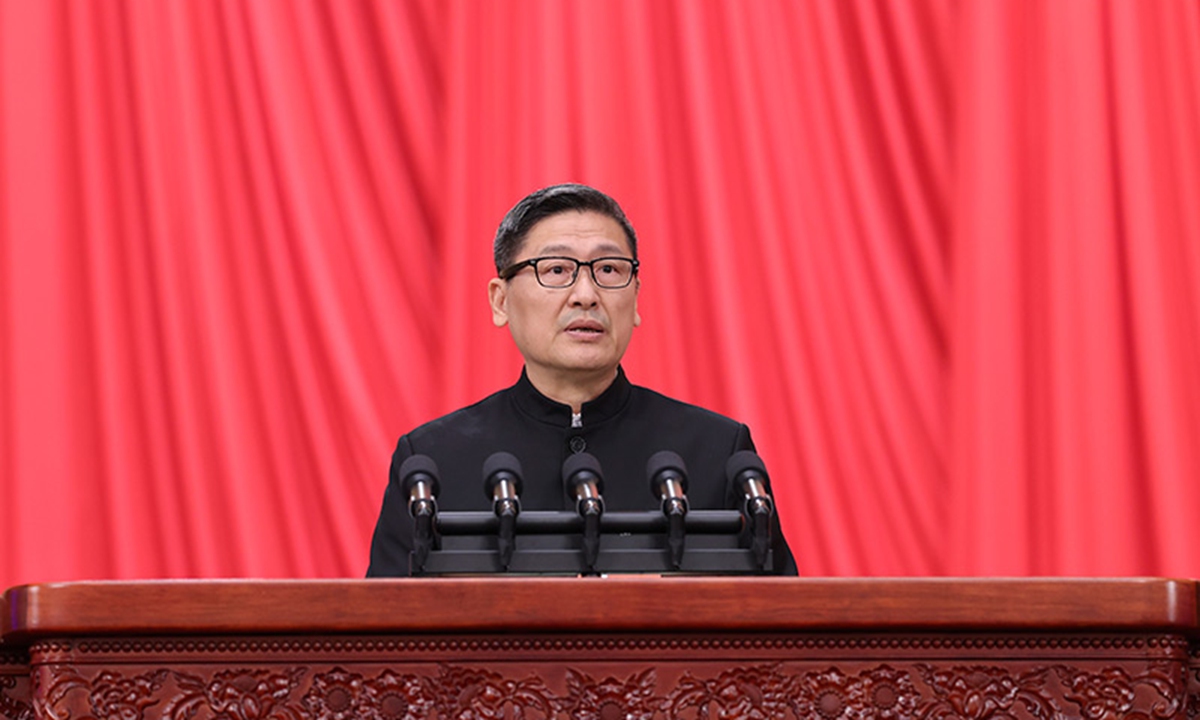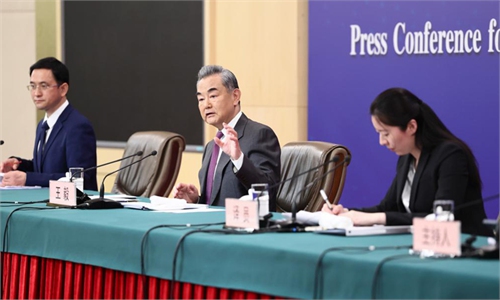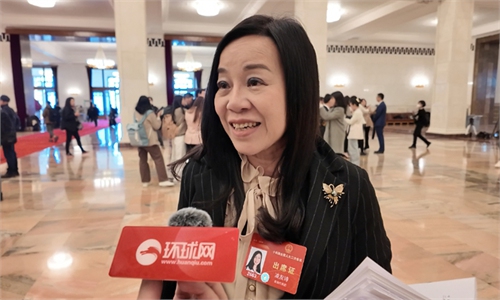
Fu Zhiguan, a member of the 14th National Committee of the Chinese People's Political Consultative Conference (CPPCC), speaks on behalf of the Central Committee of the Taiwan Democratic Self-Government League at the third plenary meeting of the second session of the 14th CPPCC National Committee at the Great Hall of the People in Beijing, capital of China, March 9, 2024. (Photo/Xinhua)
The Democratic Progressive Party (DPP) authorities cannot represent Taiwan, nor can they represent all Taiwan compatriots, as the prevailing public sentiment in Taiwan has been opposed to "Taiwan independence," deputies to the 14th National People's Congress (NPC) and members of the 14th National Committee of the Chinese People's Political Consultative Conference (CPPCC) said during the two sessions on Saturday.
The prevailing public sentiment in Taiwan has been favoring peace over war, development over decline, communication over estrangement and cooperation over confrontation, Fu Zhiguan, vice chairman of the Central Committee of the Taiwan Democratic Self-Government League, said in Beijing on Saturday.
Fu, also a member of the 14th CPPCC National Committee, made the remarks on behalf of the Central Committee of the Taiwan Democratic Self-Government League (TDSL) at the third plenary meeting of the second session of the 14th CPPCC National Committee held at the Great Hall of the People in Beijing on Saturday.
Also on Saturday, a group meeting of deputies from the Taiwan delegation was held at the second session of the 14th NPC in the Taiwan Hall of the Great Hall of the People.
When talking about the expectations for the future development of the cross-Straits relations at the meeting, Yan Ke, deputy head of the Taiwan delegation to the NPC, admitted that the current cross-Straits relations face a severe and complex situation.
The DPP authorities refuse to acknowledge the "1992 Consensus" and insist on the "anti-China" stance, attempting to rely on the US to seek "independence," seriously endangering the peace and stability of the Taiwan Straits, Yan noted.
Yan emphasized that despite the complex and severe situation, the mainland has demonstrated a firm will and confidence and always firmly grasps the initiative in cross-Straits relations and responds to the common aspiration of compatriots on both sides of the Straits for peace, development, communication, and cooperation.
The mainland firmly opposes "Taiwan independence" secessionism and foreign interference, maintaining peace, expanding exchanges, promoting cooperation, deepening integration, and advancing reunification, Yan noted.
Fu told the audience that the provocation tricks of the DPP authorities to seek secession cannot shake the status and fact that Taiwan is part of China, cannot change the basic pattern and development direction of cross-Straits relations, and cannot stop the inevitable trend of national reunification.
In recent years, a growing number of Taiwan compatriots have been willing to follow the trend of the times, uphold the national righteousness, and stand on the right side of history, Fu noted. He cited data demonstrating the meaningful integration and development cross the Straits.
Currently, there are more than 130,000 Taiwan-funded enterprises on the Chinese mainland. In 2023, over 7,000 new projects invested by Taiwan investors in the mainland were launched, with actual use of Taiwan investment totaling $2.76 billion, a year-on-year increase of 37.1 percent. The two sides have reached 481 industrial consensus and announced 72 common standards. More than 12,000 students from the Taiwan island are studying in mainland universities and colleges, and over 2,000 Taiwan teachers are teaching in the mainland.
On the last day of the six-day agenda of the second session of the 14th CPPCC National Committee, Wang Huning, chairman of the CPPCC National Committee, did not mention the cross-Straits issues in his closing remark, but the political resolution passed at the meeting also stressed the need to "deepen the integrated development of various fields across the Straits and jointly promote the peaceful reunification of the motherland."
On how to further strengthen integration, Fu proposed promoting economic and trade cooperation by better connecting the island's land, sea, and air transportation infrastructure, such as increasing more direct flights between cities, building passenger and cargo ports, as well as logistics bases to enhance convenience.
Fu also proposed facilitating higher-quality circulation of production factors between the island of Taiwan and the mainland, such as energy, resources, talent, funds, and technology between the two sides by adopting mutual recognition of industry standards, qualifications, inspection and quarantine.
"The economies on both sides of the Straits belong to the economy of the Chinese nation, and cooperation is mutually beneficial," Fu noted.
In addition, Fu highlighted the importance of continuing to optimize the business environment, encourage enterprises on both sides of the Straits to form enterprise alliances and benefit from a unified market.
"We should support micro, small and medium-sized enterprises funded by Taiwan residents to grow stronger, and enhance the sense of achievement of Taiwan enterprises in integrating into the new development pattern," Fu noted.
Fu further remarked that Chinese culture is the root of compatriots on both sides of the Straits. He proposed increasing efforts to protect cultural relics and historical sites related to Taiwan, and deeply exploring the patriotic history of Taiwan compatriots in different periods.


